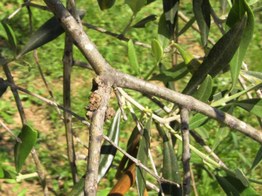AGRICULTURE: ENEA-FAO agreement to develop techniques for control of olive pests
11/5/2015
ENEA has signed an agreement with FAO to evaluate and study the impact of adopting integrated control techniques on olive pests to limit the use of chemical pesticides. The agreement concerns the Canino Municipality, an area in the Viterbo Province with a long tradition of olive cultivation, involved in an ENEA project launched thirty years ago that has been a reference point in the research, development and technological transfer targeted at the protection of the olive tree. The integrated methods to manage olive pests contained in the FAO agreement will be among the cutting-edge techniques to be presented at EXPO 2015.
 The ENEA-FAO agreement is part of the broader Directive on the sustainable use of plant protection products in force since last January, binding farms to dramatically reduce the use of phytopharmaceuticals through the adoption of agricultural practices utilizing beneficial insects to fight harmful ones, requiring leading expertise and research support.
The ENEA-FAO agreement is part of the broader Directive on the sustainable use of plant protection products in force since last January, binding farms to dramatically reduce the use of phytopharmaceuticals through the adoption of agricultural practices utilizing beneficial insects to fight harmful ones, requiring leading expertise and research support.
The study envisaged by the agreement is part of a wider European ex-post evaluation program of the impacts of scientific research from an environmental sustainability point of view (limitation of pesticides and plant protection products), economic sustainability (improved product quality, yield and commercialization for a higher added value) and social sustainability (involvement of the population in the development and application of the processes of integrated pest management).
“The project - Maurizio Calvitti, entomologist at ENEA, explains – was created to use integrated control techniques on olive pests to significantly limit the use of chemical pesticides, switching from a calendar-based approach to biological/agronomic control schemes. This practice, proving successful in the Canino area, has become pivotal in developing pest control methods increasingly oriented towards the environmental and economic sustainability of agricultural production”.
“The primary option is crop production intensification rather than area expansion - Karen Nichterlein at FAO points out - that’s why it’s necessary to further invest in research and innovation. There is often a lack of interaction among the different actors in the innovation systems, hence the necessity to share their respective expertise, cultures and skills. After the success story of Canino, FAO included this project among the six European case studies on ex post evaluation of technological and socio-economic impacts”.
The development of sustainable strategies for controlling insects harmful to agriculture or vectors of human diseases will be one of the major challenges in the future, because of the increase of sub-tropical species able to colonize with a negative impact our agro-systems, as was the case for the spread of the Xylella affecting olive trees in the Salento area.
Many insects harmful to agriculture and human health are developing resistance to common pesticides which, if used in ever - increasing quantities, can cause severe harm to human health, wildlife and the environment.
ENEA has been a reference point in the fight against insects using ionizing radiations (sterile male technique) and in the environmentally-friendly pest control management (integrated techniques), for over forty years. The Agency is currently involved in entomology research projects for the development of biology-based and ecology-based technologies for a sustainable response to agricultural and health emergencies due to the uncontrolled growth of harmful insects and weeds. The integration of the traditional ecological approach (classical biological control using natural antagonists) with the latest discoveries in the fields of physiology, molecular biology and biotechnology is at the basis of the change in the approach to this research field ENEA is undergoing.
For further information, please contact:
Maurizio Calvitti, ENEA Casaccia Research Centre, maurizio.calvitti@enea.it
